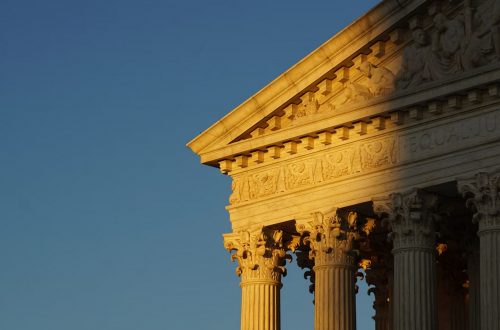 Ross Douthat said something last week that sums up my feelings exactly: “Not ashamed to say that I fear only three things: nuclear war, carnies, and the Hobby Lobby decision.” It is a clever line that might have been funny if it weren’t true. There is so much riding on what the Supreme Court decides tomorrow morning. What is so alarming about our national debate, however, is that so few of our countryman seem to be aware of what is actually at stake. The court could do the right thing and protect our first freedom, or the court could end religious liberty as we know it. Is anyone paying attention?
Ross Douthat said something last week that sums up my feelings exactly: “Not ashamed to say that I fear only three things: nuclear war, carnies, and the Hobby Lobby decision.” It is a clever line that might have been funny if it weren’t true. There is so much riding on what the Supreme Court decides tomorrow morning. What is so alarming about our national debate, however, is that so few of our countryman seem to be aware of what is actually at stake. The court could do the right thing and protect our first freedom, or the court could end religious liberty as we know it. Is anyone paying attention?
Case in point: The National Journal has an article analyzing the possible outcomes of the decision. Will the court rule in favor of Hobby Lobby and Conestoga Wood? If so, will it do so narrowly or broadly? Finally, the author considers the possibility of status quo. He writes:
Of course, the justices could also rule that the mandate is completely legal, in which case nothing changes and the world just keeps on spinning like it is now.
And therein is the problem. It’s not merely the forces arrayed against Hobby Lobby that see little threat to religious liberty in this case. Far too many people simply cannot understand what it means to be coerced by the government to violate conscience. Our fellow citizens seem to think that if their consciences aren’t being violated, then who cares if someone else’s are? There’s no real harm in that. The world will just keep on spinning like it is now.
What they fail to see is that Obamacare’s contraception mandate is one of the most egregious violations of religious liberty in the history of our republic. The United States Government is trying to force these Christian business owners to pay for insurance plans that cover abortion-inducing birth control devices. It doesn’t matter that the law violates their religious liberty to conduct business in a way that is consistent with their conscience. Obamacare mandates that these Christians comply or face coercive fines and penalties.
When the controversy over the abortion mandate erupted a couple years ago, the American public by and large got the false impression that this was about conservatives who wanted to ban contraception. Nothing could be further from the truth. No one wants to outlaw contraception. This controversy is about who must pay for it and the fact that the government is forcing pro-life business owners to pay for drugs that can cause chemical abortions. If the federal government can force citizens to purchase items that they believe to be immoral, where will this end?
If this story is a bore to you right now, try to imagine for a moment what it would be like to be in Hobby Lobby’s position. You don’t have to agree with Hobby Lobby’s opposition to abortion to do this. Would you have a problem if the federal government required you to purchase goods or services that you believe to be immoral and against your most deeply held beliefs? That is precisely what is happening to Hobby Lobby right now. If this stands, what will keep this from happening to you?
The first line of the Bill of Rights says this: “Congress shall make no law respecting an establishment of religion, or prohibiting the free exercise thereof.” Obamacare’s contraception mandate prohibits the free exercise of the owners of Hobby Lobby. We will find out tomorrow whether the Supreme Court recognizes that.




27 Comments
Roy Fuller
If Hobby Lobby prevails, what principle will prevent any owner of any business to claim a conscience exemption from government mandates? The government forces citizens to support actions they may not agree with on a regular basis – for instance when it engages in unjustified military actions and uses my tax dollars to do so. This violates my conscience, I don’t like it, but I recognize that civilized society cannot function if we let every individual citizen opt out of mandates based on violations to their conscience. The other problem if Hobby Lobby prevails will be to establish the principle that a corporation has religious liberty rights. Hobby Lobby is not a church, not a follower of Christ, but rather is a corporation. When the owners formed a corporation and established their business, they entered into the realm of commerce, which is a regulated arena. While supporters of Hobby Lobby want to keep the focus on the Christian owners and their desire to avoid supporting supporting contraceptives which violate their conscience – the precedent this case would set would have much further reaching consequences. I agree with Burk in that this case is not about contraception, (nor is it ultimately about who must pay for it). Rather it would broadly expand conscience exemptions and the definition of corporate personhood.
buddyglass
“The government forces citizens to support actions they may not agree with on a regular basis – for instance when it engages in unjustified military actions and uses my tax dollars to do so. This violates my conscience, I don’t like it, but I recognize that civilized society cannot function if we let every individual citizen opt out of mandates based on violations to their conscience.”
I get where you’re going with this, but that’s not the best example to use. If I pay taxes and the govt. uses them to pay for something I disapprove of that’s (arguably) different from the govt. forcing me to spend my money directly on something I disapprove of.
“The other problem if Hobby Lobby prevails will be to establish the principle that a corporation has religious liberty rights. Hobby Lobby is not a church, not a follower of Christ, but rather is a corporation.”
Hobby Lobby is privately held. It’s a corporation, but I suspect Green is the majority shareholder and, as CEO, is an individual tasked with making the call on what sort of insurance the company provides. He’s being told as an individual that he run his company in a way that he regards as morally reprehensible.
“While supporters of Hobby Lobby want to keep the focus on the Christian owners and their desire to avoid supporting supporting contraceptives which violate their conscience – the precedent this case would set would have much further reaching consequences.”
Depends on how the decision is worded. I really, really, really doubt the court would be so dumb as to create a precedent that would allow business owners to opt out of any regulation they choose on conscience grounds. So if they do rule in Hobby Lobby’s favor it will be in some limited fashion.
btw, despite the language in this blog post, I doubt Denny (and other Hobby Lobby supporters) would be happy with a precedent that broad. It could be abused in any number of ways they’d likely consider unacceptable.
Jane Dunn
The Hobby Lobby briefs state that the company is controlled by the Green family through a family trust, so Mr. Green does not own the shares directly. There is a degree of separation or so between the Green’s and the corporation. That makes it a lot different from the mom and pop store examples that are discussed.
buddyglass
I’m not super-familiar with how Hobby Lobby is organized. Is there a single person who has to approve the company’s decision w.r.t. insurance or who has veto power over whatever choice his subordinates make? As CEO it seems like Green would be “that guy”.
Jane Dunn
The briefs don’t give details about the ownership other than to say that it’s controlled through a family trust.
“Hobby Lobby and Mardel remain closely held family businesses, organized as general corporations under Oklahoma law, and exclusively controlled by the Greens. JA129-30, 134. David Green is Hobby Lobby’s CEO, his son Steve is President, his daughter Darsee is Vice President, and his son Mart is Vice CEO of Hobby Lobby and CEO of Mardel. JA129-30. For federal tax purposes, Hobby Lobby is a subchapter-S corporation. Pet.App.7a-8a. 2. “The Greens have organized their businesses with express religious principles in mind.” Pet.App.8a. Hobby Lobby’s official statement of purpose commits the company to “[h]onoring the Lord in all we do by operating the company in a manner consistent with Biblical principles.” JA134-35. The Greens operate Hobby Lobby and Mardel through a management trust they created, of which each Green is a trustee. Pet.App.8a; JA129-30, 134. The Greens each signed a Statement of Faith and a Trustee Commitment obligating them to conduct the businesses according to their religious beliefs, to “honor God with all that has been entrusted” to them, and to “use the Green family assets to create, support, and leverage the efforts of Christian ministries.” “
Pingback:
Don Johnson
Just saw that HL won.
Chris Ryan
“Protecting the free-exercise rights of closely held corporations thus protects the religious liberty of the humans who own and control them,” Justice Samuel A. Alito Jr. wrote in the majority opinion.
That’s the best description I’ve seen. The rights of the employees aren’t worth dirt. We’re all slaves to our corporate overlords now.
buddyglass
This opinion only infringes the rights of the (Hobby Lobby’s) employees if you consider that those rights include access to subsidized contraception.
Chris Ryan
That’s what Obamacare did, it gave employees a right to contraception (and health care more generally). So its not me, or you, or Denny, its the law of the land (except for those unlucky souls who work at Hobby Lobby).
buddyglass
Or those who work for religious non-profits, who were already affected by an employer exemption prior to the Hobby Lobby decision.
Roy Fuller
So, now that Hobby Lobby has prevailed, I will ask the question: What legal principle is in place to prevent persons from claiming a conscience exemption to laws which they do not like?
Daryl Little
Nothing and everything.
Individuals have always had the right to exemption from laws which genuinely violate their conscience.
That standard has never been “laws which they do not like”.
Roy Fuller
Well, we could perhaps debate your second sentence. Even if true, who decides “which laws genuinely violate someone’s conscience?” Your last sentence was true, until Hobby Lobby prevailed. We will now see a concerted effort on the part of conservatives who are hailing this decision, to push for a broad range of exemptions to “laws which they do not like.” Just wait and see.
Daryl Little
Are you seriously suggesting that Hobby Lobby was protesting a law they merely “did not like”?
I’ll wait. And no doubt some will. But don’t look for a flood of such cases.
Roy Fuller
I did not suggest that Hobby Lobby was protesting a law they did not like. Their beliefs about this issue seem to be sincerely held – but my point still holds – who decides which beliefs are sincerely held and which are held simply to avoid a legal mandate which the business may wish to avoid? I am suggesting that this case will open a can of worms. I hope I am wrong.
Daryl Little
Roy, you may be right. But I think the can of worms that may be opened is a better can that the worms that would’ve been released onto the church if the decision had gone the other way.
buddyglass
Let me ask Roy’s question in a more specific way.
Imagine a guy named Pete. Pete owns Pete’s Widgets, Co., which is about the same size as Hobby Lobby. Pete has a vision from God in which he is informed that blacks are the sons of the devil and that he’s to disassociate from them in every way possible. As a matter of conscience, Pete concludes he can no longer allow his company, Pete’s Widgets, to employ or serve blacks. To do would be immoral per his new religious understanding.
Based on this crisis of conscience he seeks to be exempted from the applicable civil rights laws that would normally prevent him from discriminating against blacks in hiring and in serving clientele.
Given the text of the Hobby Lobby decision (which I haven’t read yet) on what basis might a court rule that Pete must comply with the applicable civil rights laws?
Daryl Little
On what basis might they rule that he wouldn’t need to comply? There was nothing about this case whereby Hobby Lobby was asking for something that would allow them to avoid granting anyone their civil rights.
Your question is an entirely different one, more akin to a baker not making a cake for a gay “wedding”.
buddyglass
They seem pretty similar to me. In the Hobby Lobby case the govt. was saying, “As a business owner, you must do X”. In the case of federal civil rights law the govt. says, “As a business owner you must do X,” where X is “refrain from discriminating on the basis of race when hiring or choosing which clientele to serve.”
What if my sincerely held beliefs compel me to discriminate on the basis of race when hiring and/or choosing which clientele to serve? Does federal civil rights legislation trump religious freedom? Or are religious freedom protections not absolute? If they’re not absolute, what “test” should we use to determine when they may be abridged?
Jane Dunn
Buddy — The majority opinion specifically said this decision would NOT affect claimed exemptions for race discrimination because the government has a compelling interest in a non-discriminatory workplace and non-discrimination laws are narrowly tailored to meet that interest.
buddyglass
I wasn’t trying to suggest there are no criteria we can use to differentiate between the contraceptive mandate and civil rights laws. My only point is that it’s insufficiently nuanced to just say:
The first line of the Bill of Rights says this: “Congress shall make no law respecting an establishment of religion, or prohibiting the free exercise thereof.” Obamacare’s contraception mandate prohibits the free exercise of the owners of Hobby Lobby.
If that’s the case then we need to know why this statement isn’t also true:
The first line of the Bill of Rights says this: “Congress shall make no law respecting an establishment of religion, or prohibiting the free exercise thereof.” Federal anti-discrimination laws prohibit the free exercise of the owners of Pete’s Widgets.
That’s the kind of discussion that needs to happen and not blanket statements about how the govt. can’t coerce anyone to violate his or her sincerely held religious beliefs ever, which is clearly not the case (nor would any of us want it to be.)
Johnny Mason
In order for individuals to be exempt from a law for religious beliefs the following must be met:
1) It is a sincerely held religious belief
2) The state does not have a compelling interest
3) That compelling interest uses the least restrictive means possible.
From my understanding, the contraceptive mandate failed the third-test.
Chris Ryan
Yes, this is the day that America died. This ruling is such a travesty. Can’t wait ’til Scalia retires.
Daryl Little
How so?
James Harold Thomas
America is dead because there exist certain companies in America that the federal government cannot force to buy abortificiant drugs?
And they call us Pro-Lifers melodramatic.
buddyglass
Without having read the opinion yet, did they lay out any sort of “test” to be used when these claims are litigated?
If not, then that’s a terrible oversight.